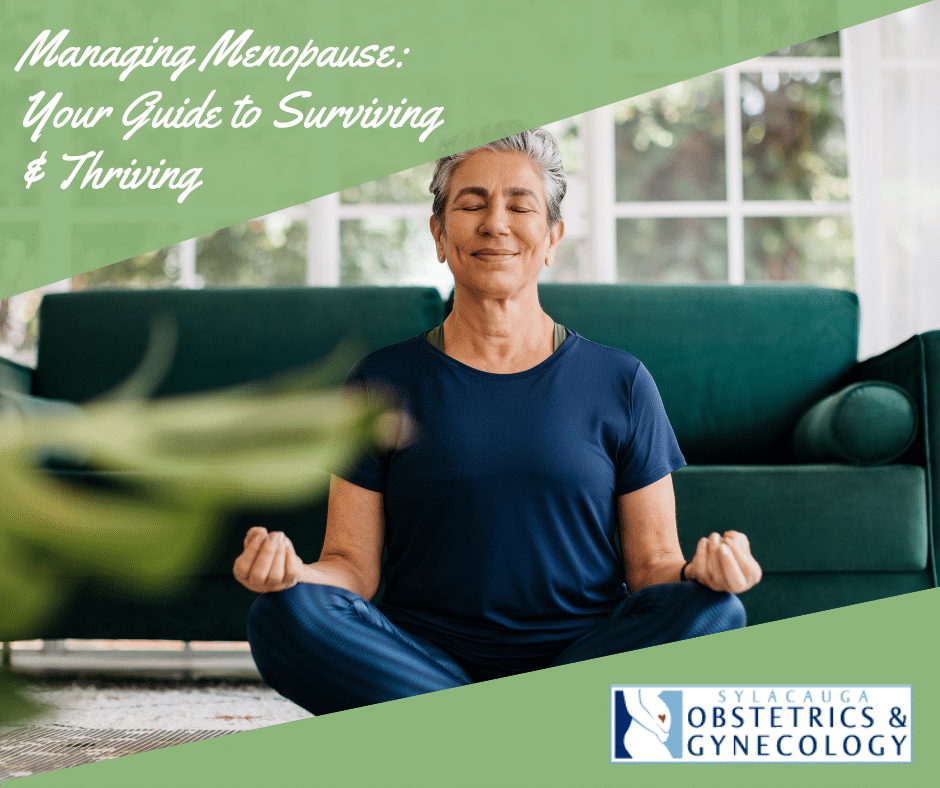
18 May Managing Menopause: Your Guide to Surviving & Thriving
As most women are all too keenly aware, periods don’t last forever. But unfortunately, we don’t usually associate the end of menstruation with celebration. Instead, despite the fact that some 6 million American women reach menopause every day, misconceptions about what menopause really is lead many to suffer its most uncomfortable symptoms in silence.
At Sylacauga OB-GYN, we want women in our community to know that menopause relief is real and attainable. That’s why Dr. McInnis and Dr. Surles have shared insight on the topics they talk about most often with their patients. Get the answers to your most frequently asked menopause questions here, including how to find relief in a safe and effective way!
What is Menopause?
Your mom may have called it “The Change of Life,” but that doesn’t really explain a lot about what it is. Menopause is when you stop having menstrual cycles, and therefore it marks the end of your reproductive age. Your ovaries stop releasing eggs and your body’s production of hormones like estrogen and progesterone starts to decrease.
Oftentimes, our patients ask us to check their hormone levels to determine whether they have entered menopause. But this doesn’t really tell us much—you could have hormone imbalances for a number of reasons. Instead, we listen to symptoms to determine whether you may be in perimenopause (the stage leading up to menopause). A woman is officially in menopause when her cycles have stopped for a full year (12 months).
What Are the Signs of Menopause in a Woman?
Perimenopause is the name for the transition phase into menopause. This phase can last anywhere from 2 to 10 years, depending on the individual. Some women experience very noticeable and uncomfortable symptoms, and others have almost none. We encourage you to talk to your gynecologist if your symptoms begin to interfere with your daily life.
Menopause symptoms can be much more disruptive than they sound. For instance, hot flashes are more than just feeling a little warm—they’re often intense bursts of drenching sweat, rapid pulse, and hot, red skin. They can jolt you awake in the night, disrupting your sleep patterns and affecting your concentration.
Other common signs that you may be approaching menopause include:
- Night sweats
- Trouble sleeping
- Mood swings
- Vaginal dryness
- Frequent urination
- Symptoms that feel like PMS
- Changes in your sex drive
If any of these symptoms cause a major change in your quality of life, schedule an appointment with your OB-GYN! You deserve help managing these issues safely and effectively.
When Does Menopause Start?
The average age of menopause is 51, though any age between 46 and 53 is generally considered normal. Some women begin perimenopause in their late 30s when the estrogen levels produced by the ovaries naturally begin to fluctuate. You may notice changes in your menstrual cycle around this time, which is normal. Still, tell your gynecologist about any changes so they can help you track anything that feels out of place.
What is the Difference Between Natural and Surgical Menopause?
Natural menopause is a gradual change that happens to all menstruating women eventually. However, if you have a hysterectomy or oophorectomy (surgical removal of the ovaries), you will experience surgical menopause.
The symptoms of surgical menopause can be more severe, as the body has less time to adjust to the hormonal changes. After all, removing the ovaries eliminates the primary source of estrogen and progesterone, causing an abrupt drop in hormone levels. Women who undergo these procedures may experience more intense hot flashes, night sweats, vaginal dryness, mood swings, and other menopausal symptoms.
That said, treatment options are available to help ease these symptoms, including hormone replacement therapy, which brings us to our next topic.
What is the Best Treatment for Menopause?
The gold-standard treatment for menopause symptoms is hormone replacement therapy (HRT). The goal of HRT is to replace the estrogen and progesterone that your body has stopped producing, restoring a sense of balance and normalcy. HRT comes in a variety of doses and forms, which can be personalized to your unique needs.
Many of our patients come to us concerned about the safety of HRT. It’s true that HRT is not for everyone, but there are very few situations where we would not recommend it. These might include women with a history of certain cancers (breast, ovarian, or uterine) or blood clots. But for the majority of women, these medications are a highly safe and effective way to reclaim their quality of life.
Do I Still Need to See a Gynecologist After Menopause?
Yes! Many women think that after menopause, they no longer need their regular gynecological visits, pap smears, or mammograms. However, keeping these appointments is still very important, both to catch potentially life-changing conditions early on and to help you keep track of your overall health. We recommend a gynecological visit once per year, a pap smear every 3 years, and a mammogram every 1–2 years.
Get Answers to All Your Questions at Sylacauga OB-GYN
If you still have questions about menopause, that’s perfectly natural! Menopause is a unique experience for every woman, and it’s one that you should feel comfortable talking about with your gynecologist. If you’re seeking answers and haven’t been sure where to find them, make an appointment with one of our compassionate OB-GYNs right here in Sylacauga!
Get Effective & Safe Gynecological Treatment at Any Stage of Life in Sylacauga, AL
Sylacauga OB-GYN serves women in the Coosa Valley Area, including Sylacauga, Talladega, Alexander City, Childersburg, Birmingham, Clay County, and Coosa County. With no parking fees, no confusing and complex campuses to navigate, and nothing but the best interests of our patients at heart, we strive to be your trusted partner in women’s health. Contact us online or call (256) 510-7165 to schedule your appointment.


